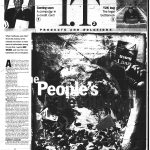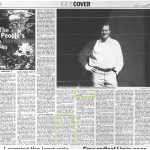Not many people have a life-changing dream and live to see that dream fulfilled. Kylie Davies was only 48 when she died from a heart attack on 2nd November 2019.
Kylie, the Founder of Computerbank, died a few days after Computerbank’s 20th-anniversary celebration. Computerbank, a self-funded not-for-profit based in North Melbourne, has saved 10,000 computers from landfill. Volunteers refurbish the machines with open-source software and sell them at below bargain basement prices to people on low incomes. Despite having the autoimmune disease Lupus since her twenties, Kylie drove Computerbank to success.
Why did Kylie start Computerbank? In the late 90s, computers had a very short life span. Kylie knew that discarded pcs from businesses were going to landfill. Australian society was dividing into the haves, and the have nots, a digital divide. Not having access to a computer or the Internet, meant some people were slipping behind. Governments of all persuasions were doing next to nothing about this social, financial and ecological dilemma. Kylie saw clearly that this digital divide put added stress on struggling families. She wondered how families on a low income could access computers heading to landfill.
Kylie set to work on the idea of recycling computers using free and open-source software, as part of her social work studies at Victoria University. In Melbourne, at the time, there were two computer recyclers. They both put Microsoft Windows on their devices. Their machines ran slowly and cost a few hundred dollars each to buy. In contrast, Kylie found that putting the Linux operating system on recycled machines had two advantages. Firstly, because Linux is free, the refurbished computers would be cheaper. Secondly, Linux ran much faster on older devices than Microsoft products.
In a twist of fate, Kylie’s project got an unexpected boost. The AGE newspaper interviewed Kylie’s partner about his Linux business. The journalist, Eric Wilson, casually asked Kylie what she thought of Linux. To Kylie’s delight, The AGE published her comments in their IT supplement on the 6th October 1998. The article, ‘The People’s Revolution’[1], reported: ‘her vision is for ComputerBank to reload old 386 PCs tossed out by corporations with lightweight, free Linux applications, for distribution to kids in low-income families who can’t afford a new PC’. Many people contacted The AGE wanting to get involved in the ComputerBank project. Not long after, ComputerBank Project committee meetings started. Kylie could see that using keen volunteers from the growing open-source movement in Melbourne could assist in bringing the cost of restoring pcs down even further. Kylie was right.
A few months later, Kylie got another helping hand. Her course supervisor at Victoria University, Professor Mary Grace contacted Community Information Victoria (CI Vic). She suggested Kylie for a one-semester placement. Mary knew that Executive Director Ken Young was interested in community informatics. Ken agreed to this. Ken remembers Kylie consulting with Linux organisations and businesses as she formulated a business plan. They discussed how to source old technology. Kylie set up a networked computer training room at CI Vic to test her idea. She didn’t want people going home unsure and stressed by their pc. The project wasn’t only about extending the life of the hardware. These recycled Linux machines needed to help people on low incomes.
At the end of her one-semester placement at CI Vic, Kylie submitted her final university paper in May 1999. Her essay set out the future steps and vision for Computerbank:
‘The Computerbank Project – Is It Community Development?’
Kylie wrote, ‘The Computerbank project is about equipping disadvantaged individuals, community groups and schools with information technology. [Also], with skills so that they can participate in the benefits of information technology and networked computing… The project entails the involvement of people who would regard themselves to be part of the global “free software community” or the GNU/Linux community. …Computerbank Victoria – is a “not for profit” organisation … Our purpose is to provide information technology resources that have the potential to empower people both at the individual level and at the local community level.’[2]
Juggling studies for her last year at Victoria University with the ComputerBank Project, Computerbank Victoria incorporated on 1st November 1999.
Computerbank’s first premises was temporary accommodation at Horticultural Hall in Victoria Street, Melbourne. Donations of computers started coming in. By December 1999, sixteen businesses and organisations had donated dozens of pcs. The warehouse was filling. A more permanent home was needed. Businesses were keen to see their expensive but obsolete equipment given a new life. The committee took up a lease of a warehouse in Rosslyn St West Melbourne. Later moving to 483 Victoria St. Their current premises is at 1 Stawell St, North Melbourne.
It is twenty years since Computerbank started, what has it achieved? Ten thousand computers have been refurbished and distributed to pension card holders from little more than the cost of a packet of cigarettes. Thus, making pcs available to people on the lowest of incomes. Asylum seekers can get a free computer. More than 100 people attended Computerbank’s work-for-the-dole program. Computerbank continues to use Linux, free, open-source software on its computers and has taught thousands of people how to use a computer. It has given volunteer work experience to IT students, job seekers and retirees. An impressive achievement for a small not for profit that is funded by its operations, not government grants.
I volunteered at Computerbank for 16 years as their web developer and in computer sales and training. Kylie and I would chat from time to time with Computerbank’s customers. One day we asked a teenager waiting for her computer where she learnt English. The girl said in a refugee camp, but your English is excellent; how long were you there? We spent thirteen years on the Thai-Burma border, she said. Another day we trained some newly arrived Congolese. They had been in Australia one week when we met them. Kylie noticed a young boy saying the word ‘hat’ over and over. He used his mouse repeatedly to move a hat on and off a cartoon character’s head. Each time he moved the mouse, he heard the word hat, a new English word for him and his first day using a computer. In our shop, our oldest customer, aged 99, returned to get a more modern machine. This was his third computer from us in twelve years. Kylie reminded me of the time a father came in with his daughter. She was wearing a hijab. The father asked for our best computer for his daughter. She is brilliant at maths he said bursting with pride, she is going to be an engineer he said.
Kylie’s autoimmune disease, Lupus continued to weaken her. In 2015 she left Computerbank. She had a kidney transplant shortly after, but the new kidney failed. Kylie never regained her full strength after this.
Kylie dressed smartly and exclusively from recycled clothing shops. Money held no importance to her. She only ever earned a part-time wage. What motivated Kylie? She was always a bit of a rebel. Her first high school expelled her. When she transferred to the newly opened Keilor Downs Secondary College, again she clashed with authorities, this time by persisting in wearing Doc Martins shoes. She fought for Doc Martins to be part of the official school uniform and won. Nurtured by her teachers, the highly intelligent young Kylie slowly started to appreciate the value of education. She was the first from her school to go to Melbourne University. Kylie had a clarity of thought, she was passionate about using Linux to extend the life of discarded computers to help those on a low income.
In May 2019, Kylie wrote in her blog. ‘Big news this week is Microsoft announcing they will use a Linux kernel (emulation architecture) in the next release of Windows. Wow … Turns out back in 1999 in conceiving the Computerbank project and using GNU/Linux/free/open-source software for recycling and redistribution of donated computers – I (and others) were on the right track. If a bunch of people can create something like this (GNU/Linux) – for the common good and to share – just maybe there is still some hope for the world.’
I had lunch in Brunswick with Kylie the day before she died. It was a chirpy, happy lunch. Kylie was thrilled Computerbank had celebrated its 20th anniversary. We had both attended the party. Picture 10,000 computers, saved from landfill, recycled, refurbished and delivered. Well done, Kylie.
By Jan Smith, Computerbank Victoria, Past President
Author of ‘Gimp For Absolute Beginners’ Springer, New York 2012
[1] The People’s Revolution, The Age, 6th of October 1998
[2] The Computerbank Project – Is it Community Development?, Kylie Davies, 11th of May 1999



